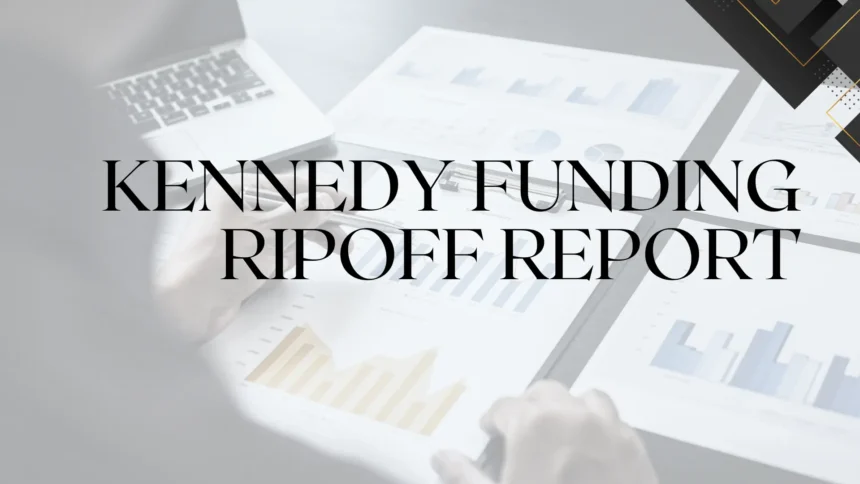Have you ever come across a company that seems to spark both praise and controversy at the same time? That’s exactly the case with Kennedy Funding, a name that frequently appears in online discussions about private lending. Among the chatter, one topic that continues to surface is the “Kennedy Funding ripoff report.” But what does it really mean? Are the claims legitimate, or is there more to the story than meets the eye?
In this article, we’ll take a friendly, balanced look at the situation. We’ll explore what Kennedy Funding does, why it has faced criticism, and how borrowers can protect themselves in the world of private lending.
Understanding Who Kennedy Funding Is
Before diving into the controversy, let’s get a clear picture of who Kennedy Funding actually is. Based in New Jersey, Kennedy Funding is a private direct lender that specializes in bridge loans, commercial real estate loans, and land financing. Unlike traditional banks, which often have strict requirements and long approval processes, Kennedy Funding focuses on speed and flexibility.
They’ve been around for several decades and have built a reputation for taking on deals that many banks won’t touch. This includes financing projects in development stages or properties that need fast funding to meet tight deadlines.
To many real estate investors, Kennedy Funding has been a lifesaver. But like any major player in the lending world, they’ve also attracted criticism from borrowers who felt disappointed or misled.
Where the Ripoff Reports Came From
The phrase “Kennedy Funding ripoff report” mainly refers to online complaints found on consumer review platforms such as Ripoff Report, Trustpilot, or Better Business Bureau listings. Some of these complaints claim that borrowers were charged fees upfront or were unable to secure the funding they expected.
Most of the negative reviews revolve around the loan process, especially when deals didn’t close as borrowers had hoped. Some users felt that communication wasn’t transparent enough or that terms changed during the process. Others claimed they lost money through application or due diligence fees when the funding didn’t go through.
However, it’s important to note that these reports represent individual experiences. Just as there are complaints, there are also positive reviews from clients who praise Kennedy Funding for saving their real estate projects when banks turned them away.
Why Controversy Exists in Private Lending
Private lending is a unique and high-risk space. Unlike traditional loans backed by major banks, private lenders often deal with projects that carry uncertainty — such as undeveloped land, international properties, or distressed assets.
Because of that, lenders like Kennedy Funding have to take extra precautions. They often charge upfront fees for due diligence, appraisals, and legal work before committing large sums of money. These fees are non-refundable since the lender must pay professionals to evaluate each deal.
This is where the misunderstanding often begins. Borrowers, especially those unfamiliar with private lending, may assume that paying a fee guarantees funding. When the deal doesn’t close, frustration naturally follows — and that’s when ripoff reports appear online.
Looking at Both Sides of the Story
To understand the full picture, it’s fair to consider both perspectives.
From the borrower’s side, some clients feel misled when communication isn’t clear or expectations aren’t met. If a project fails to meet the lender’s requirements or if the loan falls apart at the last stage, the borrower might walk away empty-handed — minus the fees paid upfront. That can understandably feel like a loss.
From Kennedy Funding’s side, they argue that their business model is transparent. They emphasize that fees cover real expenses and that every client is informed of the process before signing any agreement. Moreover, many of their successful borrowers have publicly shared stories of how Kennedy Funding came through when other lenders would not.
The truth likely lies somewhere in between. Some borrowers may have entered the process without fully understanding the risks, while others may have encountered legitimate issues.
Lessons from the Ripoff Reports
Whether the complaints are fair or not, they do highlight some important lessons for anyone dealing with private lenders.
-
Read every document carefully.
Before signing anything, take time to understand what you’re agreeing to. Pay close attention to refund policies, due diligence fees, and timelines. -
Ask questions early.
Don’t hesitate to clarify any point that feels unclear. A reliable lender will welcome your questions and offer straightforward answers. -
Understand that approval is not guaranteed.
In private lending, paying an application or due diligence fee doesn’t automatically secure funding. It’s simply part of the process to determine if the project is viable. -
Check reviews but verify facts.
Online reviews can be helpful but should never be the only source of truth. Look for patterns in feedback and see how the company responds to complaints.
Kennedy Funding’s Response to Criticism
Over the years, Kennedy Funding has publicly addressed some of the criticism. The company maintains that it follows strict due diligence procedures and that clients are fully aware of how the process works. They’ve also highlighted successful deals in the U.S. and abroad as proof of their credibility.
According to several press releases, Kennedy Funding has financed projects in over 30 countries, including large-scale developments in South America, Europe, and the Caribbean. This global reach suggests they continue to attract serious investors despite negative online buzz.
That doesn’t mean all criticism is baseless. In any industry that handles large sums of money and high-risk projects, disagreements are bound to happen. But Kennedy Funding’s longevity in the business shows that many clients still trust their services.
How Borrowers Can Protect Themselves
When dealing with private lenders, it’s essential to protect your own interests. Here’s how:
-
Get everything in writing. Every promise, rate, and condition should be clearly stated in the contract.
-
Consult a financial advisor. A second opinion from an expert can help you spot red flags or unrealistic terms.
-
Verify the lender’s track record. Ask for proof of past successful deals similar to yours.
-
Understand the risk. Private loans often come with higher interest rates and fees. Make sure your project can handle those costs.
By taking these precautions, borrowers can avoid misunderstandings and ensure a smoother experience.
The Bigger Picture: Reputation in the Digital Age
The internet has changed the way companies are judged. One or two bad reviews can spread quickly and shape public perception. Yet, not all online complaints tell the whole story.
For Kennedy Funding, the term “ripoff report” doesn’t define their entire business. It’s simply a reflection of individual frustrations in a complex lending process. In fact, some clients have come forward to defend the company, stating that they received funding exactly as promised.
It’s also worth noting that Ripoff Report itself is a platform that doesn’t remove posts, even if a complaint is later resolved. That means some older or outdated claims may still appear online, even if the situation was addressed years ago.
Final Thoughts: Finding the Truth Beyond the Noise
So, is Kennedy Funding a ripoff? The honest answer is — not necessarily. Like any company in the financial world, it has its share of unhappy clients, but it also has many success stories. The key is understanding what kind of lender they are and what risks come with that territory.
If you’re considering working with Kennedy Funding or any private lender, go in prepared. Research the company, read reviews, ask tough questions, and know what fees you’re responsible for. Transparency goes both ways — lenders should be clear about their process, and borrowers should take time to understand it.
At the end of the day, the phrase “Kennedy Funding ripoff report” shouldn’t scare you away. Instead, it should remind you to approach every financial deal with curiosity, caution, and confidence. When both sides communicate openly and honestly, real opportunities can emerge — even in the high-stakes world of private lending.

